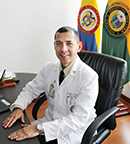As a result of the severe acute respiratory syndrome coronavirus 2 (SARS-CoV-2, or COVID-19) global pandemic, medicine—including oncology practice—will never be the same. We find ourselves in a time of emergency medicine for all specialties, technologic innovation (eg, more prevalent use of telemedicine), an influx of information from the scientific community and governing authorities, and emotional duress, all at the same time.

Luis E. Pino V, MD, MSc, MBA
Impact of Challenging Times
Health-care experiences shared from China, Spain, and Italy have changed our perception of what value means in the middle of this pandemic. Levels of scientific evidence have changed dramatically for expert recommendations and fast-tracked clinical investigations, such as the Solidarity trial (an international study comparing four treatment options for COVID-19) and TERAVOLT trial (another international collaboration studying thoracic cancers in the COVID-19 setting). Based on these uncertain and challenging times as well as the experiences of my colleagues around the world, I offer these 10 changes that I hope will be the principles of my medical practice in oncology during and after COVID-19:
1. I will continue to prioritize a work-life balance for both my patients and for myself. This is my highest priority.
2. I will increase face-to-face interactions with my patients: see them, talk to them, and listen to them. I will use technology when the situation warrants it, but, overall, focus on face-to-face visits.
3. I will continue carefully analyzing clinical evidence by crossing the hard outcomes with the expectations of my patients. I promise also to include in my analysis cultural and unstructured evidence usually brought to me by my patients and their caregivers.
4. I will learn more about interventional pharmacoeconomics to use protocols that can increase the time free of interventions for my patients, to limit health-care waste.
5. I will use prioritization matrices to clarify my expectations and to reduce stress.
6. I will avoid the problem of therapeutic illusion—the belief that interventions are more effective than they actually are in practice—by understanding that good and bad outcomes depend on nonmedical factors that I must evaluate and understand.
7. I will speak more with my colleagues, not only to share and learn medical concepts, but also to understand that I am surrounded by fantastic human beings who can help me grow exponentially. This will be my motivation to attend medical conferences in the future.
8. I will continue designing cognitive health technologies to facilitate my practice, free myself from administrative tasks, and improve interactions with my patients and colleagues.
9. I will measure the results of my medical practice with descriptive data, including measuring the impact of personal indicators of experience and well-being in addition to traditional parameters.
10. Just as I will understand that my patients and colleagues are unique and exceptional, I will increase my social interactions and appreciation of nature. I will return to my family every day, grateful for another day alive. Today, I leave my shoes and my surgical dress at the entrance, but tomorrow I will leave the bad memories, daily fatigue, and negative energy to be a better human being and, therefore, a better oncologist.
Concluding Remarks
Given these uncertain and evolving times, our oncology community needs to come together and implement strategies to continue to provide high-quality care to our patients regardless of the circumstance. I will strive to meet these expectations I have set for myself and challenge my colleagues to do the same and set intentions to maximize quality care in the wake of COVID-19.
DISCLOSURE: Dr. Pino is a consulting advisor for AstraZeneca, Roche, MSD, and BMS.

